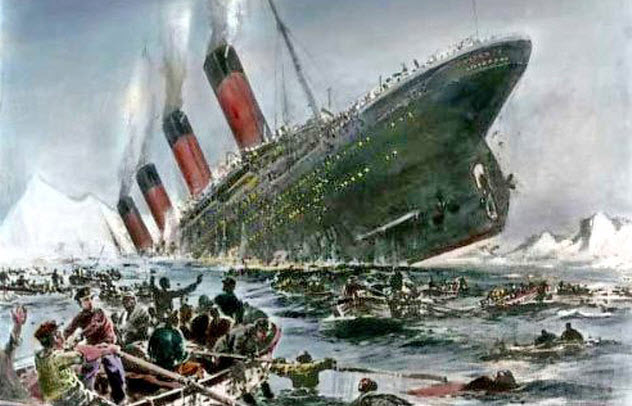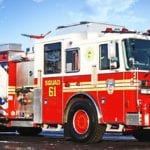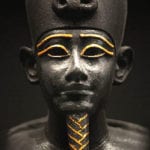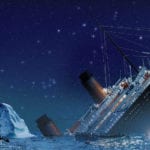 History
History  History
History  Health
Health 10 Everyday Activities That Secretly Alter Consciousness
 History
History Top 10 Historical Disasters Caused by Someone Calling in Sick
 Animals
Animals 10 New Shark Secrets That Recently Dropped
 Movies and TV
Movies and TV 10 Forgotten Realities of Early Live Television Broadcasts
 Technology
Technology 10 Stopgap Technologies That Became Industry Standards
 Weird Stuff
Weird Stuff 10 Wild Facts About Taxidermy That You Probably Didn’t Know
 Travel
Travel 10 Beautiful Travel Destinations (That Will Kill You)
 Miscellaneous
Miscellaneous 10 Modern Marriage Rituals Born from Corporate Branding
 Weird Stuff
Weird Stuff Ten Bizarre Visions of 2026 from Fiction
 History
History 10 “Modern” Problems with Surprising Historical Analogs
 Health
Health 10 Everyday Activities That Secretly Alter Consciousness
 History
History Top 10 Historical Disasters Caused by Someone Calling in Sick
Who's Behind Listverse?

Jamie Frater
Head Editor
Jamie founded Listverse due to an insatiable desire to share fascinating, obscure, and bizarre facts. He has been a guest speaker on numerous national radio and television stations and is a five time published author.
More About Us Animals
Animals 10 New Shark Secrets That Recently Dropped
 Movies and TV
Movies and TV 10 Forgotten Realities of Early Live Television Broadcasts
 Technology
Technology 10 Stopgap Technologies That Became Industry Standards
 Weird Stuff
Weird Stuff 10 Wild Facts About Taxidermy That You Probably Didn’t Know
 Travel
Travel 10 Beautiful Travel Destinations (That Will Kill You)
 Miscellaneous
Miscellaneous 10 Modern Marriage Rituals Born from Corporate Branding
 Weird Stuff
Weird Stuff Ten Bizarre Visions of 2026 from Fiction
10 Incredible Stories of Heroism in the Midst of Tragedy
Many people carry the hope that they will be the one that helps as many people as possible in the event of a disaster. They hope to be the hero and not the one that flees the scene. However, there is no way to know whether you would run or stay and help until the very moment you are faced with a life and death situation.
The heroic people on this list came face-to-face with devastation and death and chose to stay.
Related: 10 Times A Homeless Person Was A Hero (For Real)
10 Women and Children First

As the RMS Titanic began to sink during the freezing cold early morning hours of April 15, 1912, chief baker Charles Joughin knew he wouldn’t survive. Instead of going into a state of panic, he spurred on the other chefs to help him pack food and supplies into the lifeboats. When this task was done, he helped women and children board lifeboats, eventually “throwing” those who refused to leave the doomed ship into the boats to ensure their survival. He also heaved deck chairs overboard, hoping that those who couldn’t make it into lifeboats had something to cling to.
Joughin is believed to have been the last person to leave the Titanic, gripping the safety railing as the ship sank into the -2°C (28°F) water of the Atlantic Ocean. The baker spent almost three hours in the sea before being rescued, suffering only swollen feet. He also ingested a copious amount of whisky before going down with the ship, which is thought to have warmed his body enough to withstand the frigid temperature.[1]
9 When Disaster Strikes
Miami’s beach paradise became the center of devastation and despair on June 24, 2021, when the 12-story Champlain Towers South condominium partially collapsed, killing 98 people. Out of the four people rescued from the rubble, one died in the hospital. Thirty-five people were rescued from the remainder of the building that remained standing, and a further 11 were injured.
Nicholas Balboa was out walking his dog when he experienced what felt like an earthquake. In shock, he realized that the nearby building was coming down, and when he heard a boy crying for help, he immediately ran toward the crumbling structure. When he saw a hand sticking out of the debris, he and another person scrambled onto the huge mound of rubble and were soon assisted by emergency personnel. The boy was stuck under his bed frame and was pulled to safety by Balboa and the other rescuers. Fifteen-year-old Jonah Handler survived but unfortunately lost his mother in the tragedy.[2]
8 A Day of Terror
Many heroes sprang into action on December 26, 2004, when the Indian Ocean earthquake caused a massive tsunami that wrecked coastlines, villages, and cities, killing almost 230,000 people. Ten-year-old Tilly Smith, who had been on vacation in Phuket with her family, had watched a video of a 1946 Hawaii tsunami in her geography class two weeks earlier. Before her eyes, the black and white video came to life in terrifying color as the sea frothed and receded. She pleaded with her family to believe her that a tsunami was coming, and her father eventually alerted resort staff, who cleared the beach. Tilly’s quick thinking saved around 100 lives that fateful day.
Peter Davison, a paramedic from Hobart, heard about the tsunami on the news after experiencing the initial earthquake and immediately headed to the Phuket International Hospital, where he activated their disaster management plan. For five days, he worked 16-hour shifts alongside his staff before things started settling down. Davison has been hailed a hero for his dedication in treating severely injured people and maintaining calm in mid of chaos.[3]
7 The Tragedy That Changed America Forever
As the smoke rose from the World Trade Center, there was panic in the air. People were trapped above the impact zones, elevators started falling, and in desperation, some decided to jump from mangled windows. While many lost their lives on that fateful day, some brave men and women helped save others—here are just a few of them.
Benjamin Clark, a 39-year-old former Marine and chef, helped everyone on the 96th floor of the South Tower escape the building. He saw a woman in a wheelchair on his way down and didn’t hesitate to help her too. Unfortunately, Clark died in the South Tower after it collapsed, leaving behind his wife and five children. He was one of many heroes that selflessly helped others that day, losing their own lives in the process.
Thomas Burnett, who was on board the hijacked United Airlines Flight 93, hatched a plan along with a group of other passengers to try and regain control of the plane. The plane eventually crashed in Pennsylvania, but Burnett and the other passengers were posthumously lauded for their efforts and credited with preventing the hijackers from crashing the plane into the White House or Capitol building.
WTC maintenance worker, William Rodriguez, was in the basement of the North Tower when tragedy struck. He climbed the stairs alongside firefighters, unlocking doors wherever possible, and helped save hundreds of lives. (Link 4) [4]
6 “Come, I’m here!”
On March 15, 2019, 28-year-old Brenton Harrison Tarrant entered the Al Noor Mosque in Riccarton, New Zealand, and randomly opened fire. He continued to the Linwood Islamic Center while continuously shooting at the people inside. Sadly, 51 died, and another 40 were injured.
Forty-eight-year-old Abdul Aziz didn’t think of hiding from the crazed terrorist for one moment. Instead, focusing on the fact that his four sons and dozens of other people were inside the Linwood Mosque, he grabbed the first weapon he could find. In this case, the weapon was a credit card machine. Brandishing the device, he ran outside and yelled, “Come, I’m here!” after which he threw the machine at the gunman.
Aziz then got hold of a gun abandoned by Tarrant and hurled it at the gunman’s car window. All the while, Tarrant was firing at him, and Aziz zig-zagged between cars, never taking his eyes off the shooter. Eventually, Tarrant gave up and sped off in his car with Aziz chasing him. Soon after, police officers forced the car off the road and arrested Tarrant.
Abdul Aziz has been credited with stopping the terrorist from killing more people inside the Linwood Mosque and helping to get him arrested.[5]
5 “It wasn’t hard.”
The day that lives in infamy also saw several heroes springing to action to help protect American lives. The attack on Pearl Harbor was the tragic incident that finally saw America enter the Second World War. Almost 20 naval ships and 200 aircraft were destroyed during the surprise attack by Japanese forces. More than 2,400 US soldiers died, and 1,000 were wounded.
Third Class cook, Doris Miller, was in the middle of collecting laundry when all hell broke loose on December 7, 1941. Rushing to his battle station, he found that it had been torpedoed, after which he ran to the deck and started carrying away wounded soldiers. Miller also delivered ammunition to two machine gun crews and then manned one of the guns and fired for fifteen minutes until it ran out of ammunition, even though he’d never been trained to handle weapons. The 22-year-old became the first African American to receive the Navy Cross for his bravery. Miller said afterward that “it wasn’t hard” and “I just pulled the trigger and she worked fine.”[6]
4 “I was just doing what I was taught to do.”
The deliberate sinking of the Lusitania on May 7, 1915, through a German torpedo, became one of the worst atrocities of WWI. Nearly 1,200 people lost their lives in the disaster, during which the ship split in two after a secondary explosion. Within 18 minutes of being torpedoed, the Lusitania sank, leaving passengers fighting for their lives in the freezing ocean.
Able Seamen Joseph Parry and Leslie Morton did their best to help those who were dying around them. Together, they hauled 100 people from the water. They were joined by Irish fishermen who also wanted to help. One of the survivors, pulled to safety by Parry, was a young sobbing mother clutching her screaming baby. Out of sheer gratitude, the woman took one of her baby’s booties and gave it to Parry. He treasured the bootie, writing the words “Lest We Forget Lusitania May 7, 1915” on the sole. Sadly, however, the woman and baby both died shortly after.
Another survivor later said he had seen Parry plaiting another young woman’s hair to try and keep her calm. Parry earned a Silver Board of Trade Medal for Gallantry and said afterward, “I was just doing what I was taught to do.”[7]
3 Young Heroes
On March 27, 1985, 41-year-old Willem Horne lost control of the double-decker school bus he was driving. The bus, carrying 72 students, crashed into the Westdene dam in Johannesburg, South Africa.
Mere seconds after the accident, 17-year-old matric pupil Pieter Koen was out of the open window next to his seat and on the roof of the half-submerged bus. Without hesitation, he dove into the dam water and, after a minute, pulled a fellow student out. He did this four more times, each time rescuing a student. The sixth time Koen dove into the water, he didn’t come back up.
Theo de Koker and Matthys Wehmeyer were in another bus traveling ahead of the yellow bus. When they heard screaming, they both looked around and saw the yellow bus sinking into the dam. Yelling for their own bus driver to stop, they ran, shrugging their shoes and jackets off as they went, and dove into the water. Together they rescued their friend, Deon Beukes, from the water. The two boys pulled Beukes to safety and then continued to descend and rescue students, one of which was de Koker’s sister. Another student named Danie Theron also saved three of his classmates.
Almost 3,000 people gathered around the dam, including some of the parents of the students. As they looked on, medical personnel fought to save those who had been pulled from the water. By the end of the day, 42 had died, and 30 had been saved. The bus driver also survived.
Pieter Koen and Danie Theron both received bravery awards, Koen posthumously. Four years after the tragedy, Theron took his own life.[8]
2 Unexpected Disaster
There were 47 people on the stratovolcano White Island in the Bay of Plenty region in New Zealand when it suddenly erupted on December 9, 2019. Twenty-two died, and 25 were injured, most of whom suffered severe burns.
White Island Tours manager Paul Kingi had been on the island that day, and very shortly after he left with his tour group, the volcano erupted. Kingi got into an inflatable dinghy and set off for the island. When he reached it, he managed to get 20 people to safety.
Helicopter pilot Tom Storey and two of his colleagues helped rescue 12 people from the island, despite conditions being too dangerous to fly. No other emergency service helicopters joined them because of the unsafe conditions, so Storey, Mark Law, and Jason Hill loaded the 12 survivors into their own helicopters and transported them to the nearest hospital.[9]
1 For the Sake of Saving Hundreds of Thousands of Lives
In the immediate aftermath of the world’s worst nuclear disaster, dozens lost their lives. Within 10 days, a new threat reared its head in the form of nuclear steam explosions. This type of explosion would likely have reached as far as Minsk, which is 320 kilometers (198 miles) from Chernobyl.
To prevent this from happening, a pressure valve had to be released. Three brave men took the task upon themselves, with only one of them, Alexei Ananenko, knowing the valve’s location. Ananenko, Valeri Bezpalov, and Boris Baranov dove underneath the reactor and released the valve, saving the area from an even worse disaster. Tragically, all three men suffered severe radiation poisoning after their heroic act and died within weeks. They knew beforehand that they would die because of the radiation exposure but chose to give up their lives to save the lives of hundreds of thousands of other people.[10]








